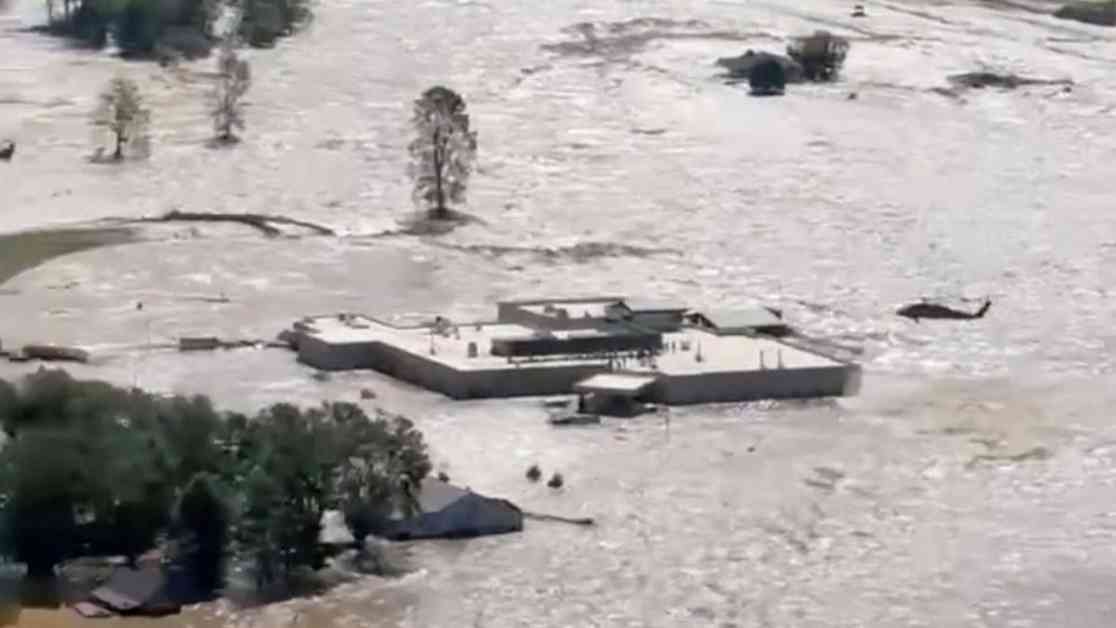At least 40 people have tragically lost their lives as Hurricane Helene wreaked havoc across the southeastern United States, leaving a trail of destruction in its wake. The powerful storm, with winds reaching up to 140 mph, has caused widespread flooding and devastation, prompting emergency crews to work tirelessly to rescue those stranded in flooded homes. Despite being downgraded to a tropical depression, Helene continues to pose “life-threatening” conditions as it moves across the country, leaving millions without electricity and prompting a flash flood emergency.
The aftermath of Hurricane Helene has been nothing short of catastrophic, with reports of houses reduced to rubble and trees uprooted by the fierce winds. The Category 4 hurricane claimed the lives of at least 15 people in Georgia alone, including a first responder, a seven-year-old boy, and a four-year-old girl who tragically perished when a tree fell on their home in Washington County, trapping them inside as the house caught fire. The devastation in Georgia is a stark reminder of the destructive force of nature that hurricanes can unleash.
In South Carolina, the storm-related death toll has climbed to at least 17, with two firefighters losing their lives when their vehicle was struck by a falling tree. Tragedy struck in North Carolina as well, where a four-year-old girl lost her life in a traffic accident amid heavy rain. The situation in Florida is equally dire, with five reported fatalities in Pinellas County, including two individuals who drowned in the floods. The loss of life and destruction caused by Hurricane Helene serve as a sobering reminder of the importance of preparedness and resilience in the face of natural disasters.
Subheadings
1. Rescue Efforts and Evacuations
2. Impact on Infrastructure and Communities
3. Climate Change and the Future of Hurricane Season
Rescue Efforts and Evacuations
In the wake of Hurricane Helene, emergency responders have been working tirelessly to rescue those trapped in flooded homes and provide aid to affected communities. The heroic efforts of first responders and volunteers have saved countless lives and brought hope to those in need. Residents have been evacuated from flood-prone areas, with shelters set up to provide temporary refuge for those displaced by the storm.
The devastation caused by Hurricane Helene has taken a toll on infrastructure, with roads washed out, bridges damaged, and power lines down. The economic impact of the storm is likely to be significant, with businesses shuttered and homes destroyed. As communities begin the long process of recovery and rebuilding, the resilience of the human spirit shines through in the face of adversity.
Impact on Infrastructure and Communities
The destruction caused by Hurricane Helene has underscored the vulnerability of our infrastructure and the need for stronger measures to mitigate the impact of future storms. The failure of dams and levees has led to catastrophic flooding in several areas, displacing residents and causing widespread damage. The long-term effects of the storm will be felt for years to come, as communities struggle to rebuild and recover from the devastation.
The impact of Hurricane Helene on communities across the southeastern United States is a stark reminder of the collective threat posed by climate change. The warming of our oceans and atmosphere has fueled the intensity of hurricanes, leading to more frequent and destructive storms. As we confront the realities of a changing climate, it is imperative that we take action to reduce our carbon footprint and invest in sustainable solutions to protect our planet for future generations.
Climate Change and the Future of Hurricane Season
The 2021 Atlantic hurricane season has been marked by a series of powerful storms, with Hurricane Helene being the latest in a string of destructive weather events. The National Oceanic and Atmospheric Administration has warned of an above-average hurricane season, fueled by record-warm ocean temperatures and human-induced climate change. As we grapple with the impact of these extreme weather events, it is clear that urgent action is needed to address the root causes of climate change and mitigate its effects on our planet.
In conclusion, the devastation caused by Hurricane Helene serves as a sobering reminder of the destructive power of nature and the importance of preparedness in the face of natural disasters. As we continue to confront the challenges posed by climate change, it is crucial that we work together to build a more resilient and sustainable future for all. The resilience and strength of communities affected by Hurricane Helene are a testament to the human spirit and our ability to overcome adversity in the face of great challenges.













